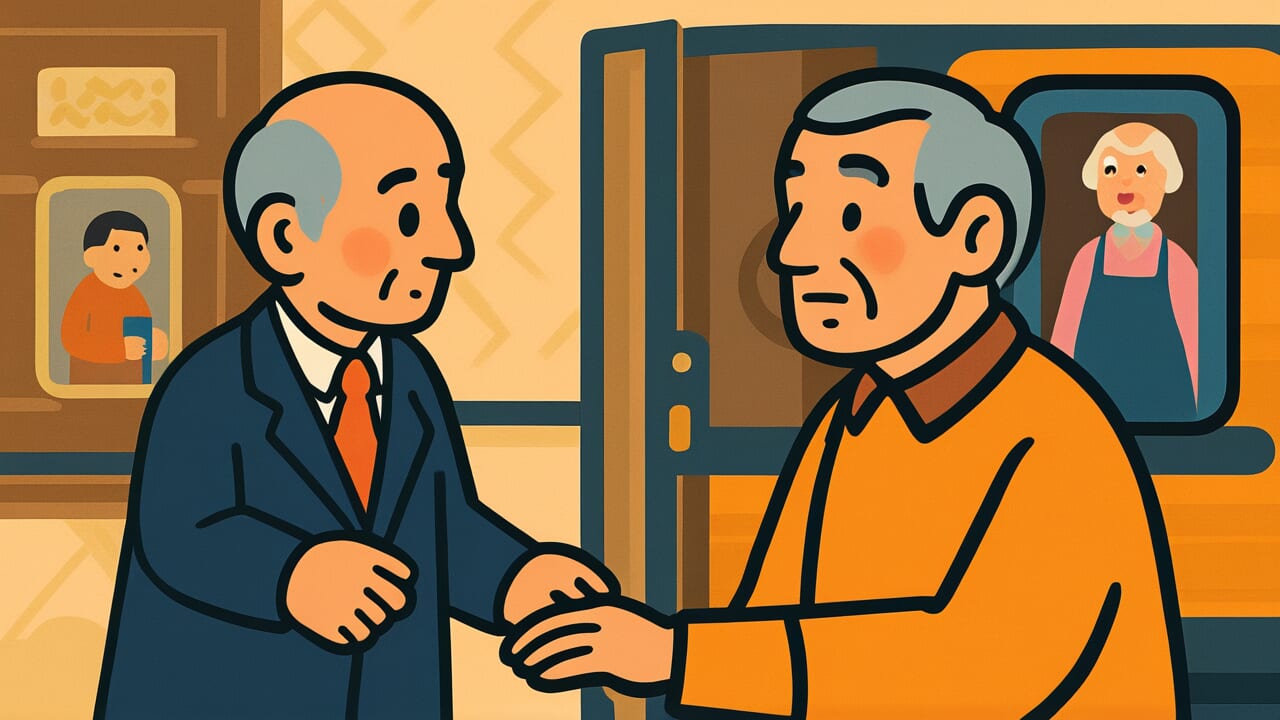How to Read “Growing old and becoming a child again”
Oite futatabi chigo ni naru
Meaning of “Growing old and becoming a child again”
“Growing old and becoming a child again” means that as people age, they return to a childlike state. Specifically, it refers to how elderly people develop characteristics similar to early childhood, both physically and mentally.
Physical strength declines and people need help from others. They require assistance with eating, dressing, and using the bathroom.
Judgment and memory deteriorate. Controlling emotions becomes difficult, leading to sudden crying or anger.
They become stubborn or selfish. They repeat the same stories over and over. These behaviors in elderly people make them seem like they’ve returned to being young children.
This proverb calmly observes the reality of aging. It suggests the right mindset for caring for elderly people.
In modern times, as society ages rapidly, more people experience the meaning of these words firsthand.
Origin and Etymology
The exact origin of this proverb in historical texts hasn’t been identified. However, the structure of the phrase offers interesting insights.
The word “chigo” is an ancient term meaning young child. It has been used since the Heian period. Sometimes it referred specifically to boys raised in temples. Here it simply means “young child.”
This proverb reflects an Eastern view of life as circular. People are born as helpless babies, grow strong, then age and return to a childlike state again.
It expresses this natural law calmly but with deep insight.
Similar expressions appear in Edo period literature when describing elderly people. This suggests the concept has been shared among Japanese people for at least several hundred years.
In times before modern medicine, people learned through daily observation. They saw that aging brings declining physical function and judgment. People need care from others in old age.
These observations crystallized into this proverb.
Interesting Facts
The human brain’s frontal lobe tends to decline with age. This leads to reduced emotional control and judgment.
Interestingly, the frontal lobe develops last among all brain parts. It remains immature during childhood.
As we age, the last part to develop is the first to decline. This means we literally approach “the brain state of childhood.” There’s scientific backing for this.
Elderly people often develop a preference for sweets, just like children. This relates to changes in taste and the brain seeking quick energy from sugar.
Usage Examples
- My grandfather has recently started acting so dependent on my mother. It really shows what “growing old and becoming a child again” means.
- Caring for my father makes me painfully understand the meaning of “growing old and becoming a child again.”
Universal Wisdom
The proverb “Growing old and becoming a child again” contains a fundamental truth about human existence. No matter how much we grow, gain social status, or accumulate knowledge and experience, we eventually return to our starting point. This is an unavoidable destiny.
This saying has been passed down for hundreds of years because it means more than simple observation. It recognizes that life is not a straight upward line but a circle.
We are all born as helpless babies who cannot survive without others’ care. As we approach life’s end, we return to that state again.
This fact teaches us humility.
At the same time, this proverb suggests the need for mutual support across generations. Just as parents once raised their children, children care for their parents.
This cycle is the foundation of human society.
We see our former selves in our aging parents. We see in ourselves what our children will someday see in their future.
Accepting this universal truth softens our fear of aging. It leads to wisdom that embraces each stage of life.
Both strength and weakness are part of being human. This proverb quietly tells us so.
When AI Hears This
The human brain accumulates vast information from birth onward. By adulthood, it holds about 2.5 petabytes (2.5 million gigabytes) of memory capacity.
However, this information accumulation is also “noise accumulation.” Social roles, others’ evaluations, and complex relationships pile up in layers. Essential information gets buried beneath them.
Information theory has a concept called “signal-to-noise ratio” that distinguishes meaningful information from noise. Cognitive decline from aging appears to be deteriorating information processing ability.
But from another angle, it can be seen as a “filtering process.” Years of accumulated social noise falls away, leaving only information essential to life.
The pure curiosity and emotional expression that infants show are raw signals. They haven’t passed through complex social filters.
What’s interesting is that this process isn’t mere deterioration. It’s closer to system “initialization.”
Computers accumulate unnecessary data over time and slow down. But initialization restores their original speed.
Humans may be similar. By letting go of complexity, we return to life’s most important information. That is the fundamental function of “feeling this present moment.”
Lessons for Today
This proverb teaches us to prepare our hearts to accept aging, not fear it. Everyone walks this path. It’s neither shameful nor sad. Rather, it’s life’s natural completion.
Modern society tends to overemphasize independence and self-responsibility. But this proverb teaches that humans naturally depend on others at life’s beginning and end.
Acknowledging this isn’t weakness. It’s humanity itself.
If you’re caring for an elderly family member now, these words offer great comfort. The person before you once cared for you unconditionally. Now it’s your turn to return that kindness.
You’ll feel frustrated sometimes. But that’s probably what your parent felt toward you once.
And if you’re still young, you’ll walk this same path someday. That’s why it’s important to build a society that respects aging and supports each other now.
This proverb quietly encourages us toward a chain of compassion across generations.



Comments